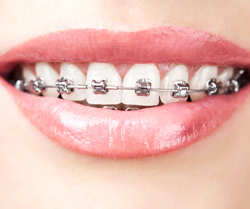Will Braces Fix My Gap?

Some find gaps between teeth attractive, a unique physical trait. But some aren’t fond of them and want them fixed.
Gaps are large spaces between teeth. They often occur between the upper front teeth, called a diastema. But they can also be present between several teeth.
Gaps can be less noticeable, while some can leave large spaces. Some gaps may close over time, especially for kids, but some may persist.
Why are there spaces between teeth?
Gaps between teeth can occur due to various reasons, including:
- Having small teeth, leaving spaces between them.
- Having a large jaw and too much room for the teeth to fill.
- Missing teeth.
- An oversized labial frenum, the piece of skin that connects the top lip to the front teeth
- Premature tooth loss, leading to misaligned teeth in adulthood.
- Incorrect tongue placement, the habit of pushing the tongue against the front teeth.
- Tissue damage or overgrowth that causes separation.
- Prolonged thumb-sucking or incorrect swallowing
What happens if gapped teeth aren’t closed
Gaps create irregular spaces between teeth. They may be charming and not cause obvious problems, but they can have disadvantages in the long run.
Here are potential issues that can occur if gapped teeth aren’t corrected:
- Hard-to-clean teeth. Irregular spaces between teeth can make the mouth harder to clean. Debris can get trapped in tight spaces and be tough to remove.
- Debris and plaque buildup. Deposits can accumulate on tooth surfaces and along the gum line if you’re unable to brush and floss your mouth well.
- Increased risk for tooth decay and gum disease. When debris settles on the surfaces of the teeth, they become food for harmful bacteria and produce acids that attack the enamel. This can result in cavities, tooth decay, and gum disease.
- Difficulty when eating, chewing, and swallowing. Biting, chewing, and swallowing food need more effort if there are large spaces between teeth.
- Premature wear and tear. Teeth work together to perform basic functions, such as chewing. When they’re misaligned, they also work harder, and this can cause them to wear faster.
- Jaw joint pains and chronic headaches. Having misaligned teeth can strain the jaw when you chew and eat and increase your risk of developing chronic headaches.
- Interferes with proper food digestion. You’re likely to swallow big chunks of food as your teeth are unable to break them down further. This may interfere with your digestion and make eating uncomfortable.
- Bad breath. The spaces between teeth serve as a breeding ground for harmful bacteria. This build-up can result in an unpleasant-smelling breath.
How are gaps between teeth treated?
Gaps between teeth may not need treatment or medical attention. See your dentist or orthodontist to know if they present potential issues to your oral health.
If you want the gap fixed for cosmetic reasons, your dentist can also recommend solutions. Getting braces is one of the most common gapped teeth solutions.
Braces correct teeth alignment by pushing the teeth to their ideal position. Your dentist may recommend braces if there are other problems related to your bite, such as an overbite. The procedure uses metal wires and brackets to enhance the shape and function of the teeth.
The time it takes to close gaps varies per individual case. The condition of the teeth and the type of braces used can impact the treatment duration.
If you have several spaces between teeth, the process will take longer. To learn more, schedule a consultation with your orthodontist in Kitchener.
Fixing gaps between teeth and correcting your bite with braces
Whatever the cause of the gaps between teeth, there are ways to correct it. Sometimes it takes more than braces or orthodontic treatments to address it. For example, your dentist may recommend procedures, such as veneers, to achieve the form and color you want for your teeth.
Do you consider your gap teeth an asset? It’s great to be confident about your smile, but still see your dentist for regular evaluations. Know how to care for your gapped teeth, so you can keep them without issues.
Braces are a great way to fix gaps between teeth, but they aren’t the only option available. Invisalign can also help correct this dental problem and enhance your smile. If you’re in Kitchener, ON, and concerned about the spaces between your teeth, our orthodontist, Dr. Caley, can help.
Contact us today at (548) 800-0496 to book a visit. Let’s find out if your gapped teeth can be kept or are better closed.
DGS powered by SmileShop


